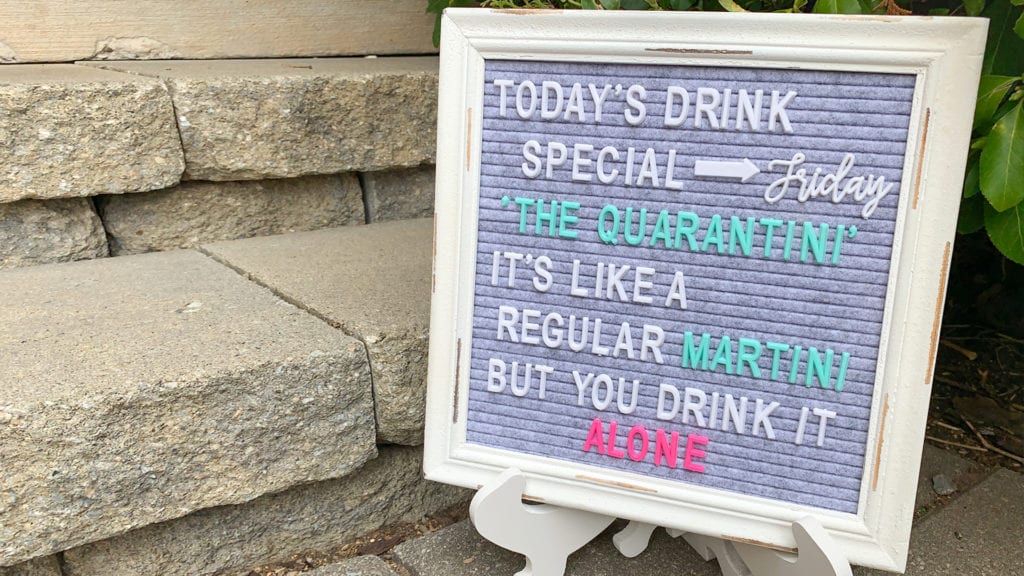Although the English language already contains around one million words, that hasn’t stopped a crop of new ones emerging amidst the COVID-19 coronavirus. Some are light-hearted, some a little darker, but most have one thing in common. They’re portmanteaus: quickly decoded mashups of two existing words. Like brunch or labradoodle or advertorial. The power of the portmanteau is that it can take something “other” and make it more familiar and often more quickly associated with positive emotions and memories.
In the case of the coronavirus pandemic and the fear of the unknown it stirs up, we name it so we can tame it.

Here are a few examples:
Quarantini: Adapted from the classic cocktail and Mad Men staple, the quarantini’s tongue-in-cheek name is how to say “not today, coronavirus” with spirits. The name predates the COVID-19 coronavirus, but it’s resurfaced with a vengeance as people seek out rewards and raise a toast to resilience.
Quarantunes: Playlists created for coping with coronavirus. A playlist for these discordant times speaks not only to music’s well-documented ability to soothe but also to human’s fundamental instinct for sharing. The Spotify playlist posted by Rita Wilson while she and husband Tom Hanks were in isolation may be the most prominent example. After she got thousands of suggestions for the playlist’s name on Twitter, the winner was, yes, Quarantunes.
The COVID 19: A play on the freshman 15, the number of pounds college students supposedly gain as they navigate a strange new world and unlimited meal plan. Like the freshman 15, the COVID 19 provides both an explanation and a side order of optimism—surely the weight gain, like the pandemic, isn’t permanent.
Quaranteens: Youth currently ages 13-19. Cut off from friends, schooled at home, deprived of rites of passage like graduation and senior prom, and facing unimaginable amounts of time with their parents, quaranteens are finding refuge online, bonding in places like Zoom Memes for Self Quaranteens or Instagram, where #quaranteen appears in 15,000+ posts.
Coronials: The newest version of millennials and the answer to the question every demographer is asking: will COVID-19 create a baby boom? Two UC Berkeley demography professors say yes, and warn that labor and delivery rooms need to gear up for a surge beginning in December 2020. They also predict that the Coronials will have the highest rate of home-schooling in modern history because of their parents’ persistent fear about lack of social distancing.
Infodemic: An epidemic of misinformation that is spread rapidly through social media, and probably amplified by doomscrolling. “We’re not just fighting an epidemic; we’re fighting an infodemic,” said WHO Director-General Tedros Adhanom Ghebreyesus in March. Mythbusters are working with companies like Google, Facebook, Pinterest, Tencent, Twitter, TikTok and YouTube to combat the rumors that threaten public health.
Covidiot: People deemed idiotic and often a threat to public health. The butt of corona-shaming for everything from hoarding toilet paper to crowding beaches, they range from celebrities called out on Twitter to neighbors called out on apps like Next Door. Psychologists attribute the embrace of publicly condemning negative behaviors as a way for people to assuage their anger and feel like they are taking action—a need that has been amplified amidst the current uncertainty.
Quaranteens, infodemic, covidiot. The words are novel, but what they tell us about human emotions is classic. They’re indicators of the beliefs and values that spark behaviors, and they can signify shifts in consumer sentiment and purchase behavior.
At Ketchum, we’re using social listening and other analytical tools to conduct landscape analyses as part of helping clients plan their rebound. Get in touch to learn more.



